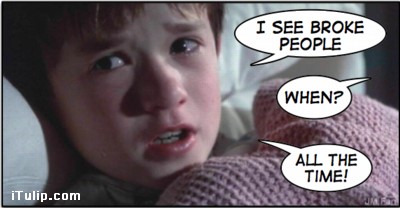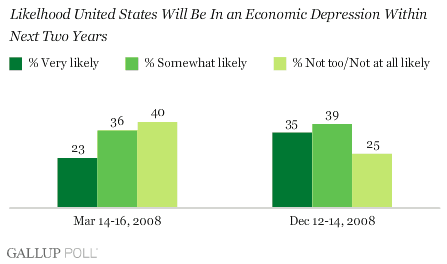 |
In The Myth of the Slow Crash August 2007 we stated: “Just because it's big, doesn't mean an economy can't go down fast. In a debt deflation, the extreme rate of change even fools central bankers.”
Economic data coming out this week reveal an economy in free-fall.
The Stats
Every single working day in the month of December 2008:
- 190 U.S. companies filed for Chapter 7 or Chapter 11 bankruptcy protection
- 4,950 Individuals filed for bankruptcy protection
- 3,100 Homes went into foreclosure
- 26,190 Jobs were lost and 25,035 workers filed for unemployment insurance
For the year 2008, the $6.9 trillion in lost stock market value among 110 million households represents a per household loss of $62,727. The $6 trillion in lost residential real estate property value nationally in 2008 adds $54,545 per household for a total of $117,272 in lost household asset value in 2008, exceeding by 27% the national household median net worth in 2007 of $86,000. (Losses were concentrated in the middle quintiles aka "the middle class.")
The Old Timer Experts
Q: How is this current economic crisis different than what you've experienced before?
A: This is as big as the big Depression. This is a type of recession/depression that happens usually after the kind of greed sprees which are associated with bubbles.
- Stephen Jarislowsky, 83, founder of investment firm Jarislowsky Fraser Ltd. that manages about $52-billion in assets for pension funds, institutions and private customers, Financial Post, Dec. 29, 2008
A: This is as big as the big Depression. This is a type of recession/depression that happens usually after the kind of greed sprees which are associated with bubbles.
- Stephen Jarislowsky, 83, founder of investment firm Jarislowsky Fraser Ltd. that manages about $52-billion in assets for pension funds, institutions and private customers, Financial Post, Dec. 29, 2008
“The economy faces a slump deeper than the Great Depression and a growing deficit threatens the credit of the United States itself.” - Former Goldman Sachs chairman John Whitehead, Reuters, Nov. 12, 2008
The People
Since March, the percentage of Americans largely ruling out the possibility of an economic depression in the next two years has shrunk from 40% to 25%, while the percentage saying it is "very likely" has grown from 23% to 35%. Although Americans who predict the worst for the economy remain in the minority, another 39% think a depression is "somewhat likely" to occur. - Gallop, Dec. 2008
Old timers like Jarislowsky and Whitehead foresee economic depression, 74% of Americans believe an economic depression in the next two years is either very or somewhat likely, and the statistics bear it out. Such is the fate of an economy as dependent on credit as the U.S. when the credit suddenly disappears and leaves old debts behind as unemployment rises and incomes decline. Debt deflations are no joke. Beware Relief Rallies. The US economy glides like a box of rocks. Don't stand under it.The Culprits
On a more encouraging note, the mainstream press are finally starting to go after a few FIRE Economy bandits.
Three federal agencies and a loose consortium of state attorneys general have for several years been gathering evidence of what appears to be collusion among the banks and other companies that have helped state and local governments take approximately $400 billion worth of municipal notes and bonds to market each year.
E-mail messages, taped phone conversations and other court documents suggest that companies did not engage in open competition for this lucrative business, but secretly divided it among themselves, imposing layers of excess cost on local governments, violating the federal rules for tax-exempt bonds and making questionable payments and campaign contributions to local officials who could steer them business. In some cases, they created exotic financial structures that blew up.
People with knowledge of the evidence say investigators are not just looking at a few bad apples, but also at the way an entire market has operated for years.
“It’s rare to sell a Senate seat, but it’s not rare to sell a bond deal,” said Charles Anderson, who retired as manager of tax-exempt bond field operations for the Internal Revenue Service in 2007. “Pay-to-play in the municipal bond market is epidemic.”
Most Americans have no idea yet just how broke we all are after if all the debt built up during the FIRE Economy era is finally accounted for, but if we look we can see the evidence everywhere. The challenge for the coming decade is coping with the debt while at the same time transitioning to a more productive and stable economic structure.
(Hat tip to iTuliper don for finding the muni story.)
iTulip Select: The Investment Thesis for the Next Cycle™
__________________________________________________
To receive the iTulip Newsletter or iTulip Alerts, Join our FREE Email Mailing List
Copyright © iTulip, Inc. 1998 - 2009 All Rights Reserved
All information provided "as is" for informational purposes only, not intended for trading purposes or advice. Nothing appearing on this website should be considered a recommendation to buy or to sell any security or related financial instrument. iTulip, Inc. is not liable for any informational errors, incompleteness, or delays, or for any actions taken in reliance on information contained herein. Full Disclaimer
To receive the iTulip Newsletter or iTulip Alerts, Join our FREE Email Mailing List
Copyright © iTulip, Inc. 1998 - 2009 All Rights Reserved
All information provided "as is" for informational purposes only, not intended for trading purposes or advice. Nothing appearing on this website should be considered a recommendation to buy or to sell any security or related financial instrument. iTulip, Inc. is not liable for any informational errors, incompleteness, or delays, or for any actions taken in reliance on information contained herein. Full Disclaimer

Comment